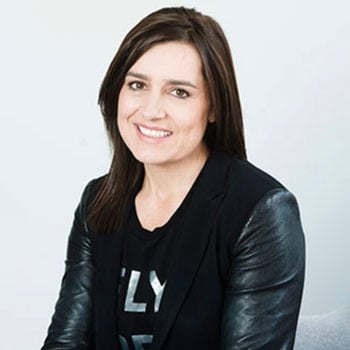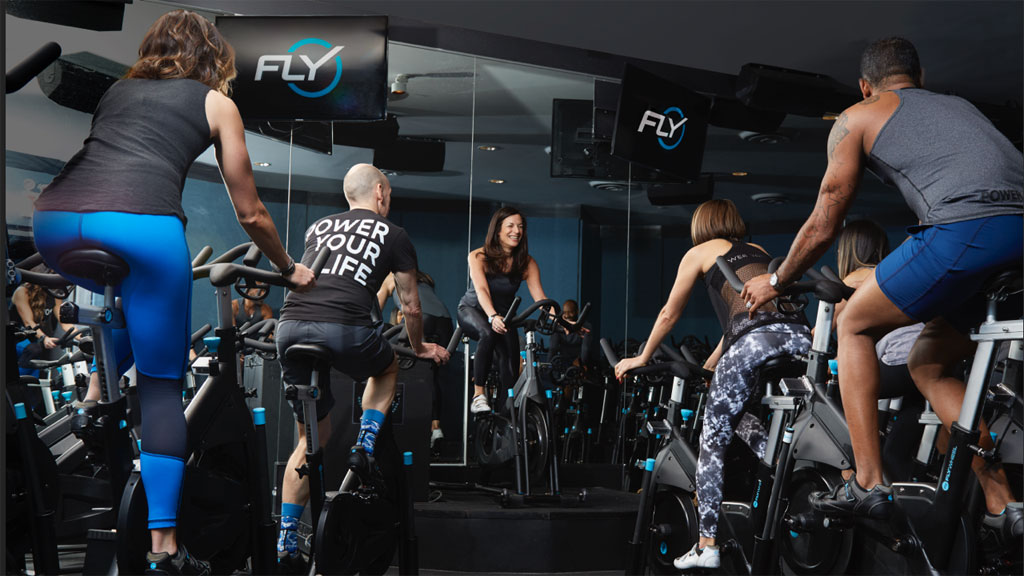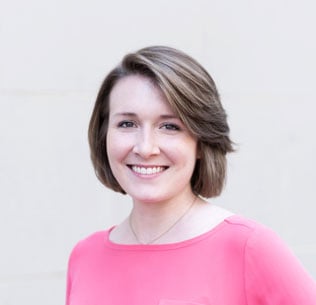Sarah Robb O’Hagan is dressed in a tank top and leggings, with a baseball cap hiding her still-damp hair. Though she easily blends in with the flock of sweaty women milling the lobby after a grueling 45-minute Flywheel ride at CityCenterDC, as the brand’s new CEO, she’s actually the celebrity guest. Despite the tough workout—which even Robb O’Hagan described as “hard”—she’s animated as she sits down to chat about her new gig. And she should be excited: After stepping down from her role as president of Equinox to focus on her content platform, Extreme You, and new book, Extreme You, Robb O’Hagan was tapped to lead the growing boutique fitness brand, Flywheel Sports.

Things weren’t always so smooth for Robb O’Hagan, something she’s upfront about in her book. Fired twice while in her twenties, Robb O’Hagan is on a mission to show that perfection is overrated and that weaknesses need to be embraced, not hidden.
Washingtonian: This is an exciting time for you. You’d walked away from Equinox to start your own thing, and now you’re jumping into Flywheel. What drew you back to working for a fitness brand?
Robb O’Hagan: When I left Equinox, I actually wasn’t trying to start a company. It was more that I was like, I knew I wanted to start a platform of content to help people reach their potential, but I didn’t really know what it would be. I knew I was going to write the book obviously, and I’d already started working on some of the tools, like the quiz on the website. The more I got into it, I was like, Okay, this is rocking along, and then along comes this opportunity with Flywheel, and I was like, Oh, I’m not looking to get a full-time job right now. But it’s funny; the act of writing the book is what helped me realize that Flywheel was so perfect for this moment because they fit so well together. I feel like Flywheel stands for everything in physical fitness that the book is standing for in life.
You’ve been now with Flywheel for a couple of months. What are some of the things you’ve been working to change at Flywheel or see it moving towards in the future?
One of the reasons I joined the company is it’s got the raw materials of so much potential. The product is great—it attracts very passionate exercisers, people who are very into fitness. This is not the kind of crowd that has a tough time getting up in the morning; they’re here to really push themselves. And what’s neat about that is they’re so into the category that there’s an opportunity to expand. We are actually going to be announcing in a few weeks some very exciting news to extend the current product so if you don’t live near a Flywheel, you can get it in your home environment.
For a while now, boutique fitness has been really big. Where is fitness going next?
The main investor behind Flywheel is Lew Frankfort, who’s from Coach handbags, and he talks about his investment thesis. Back in the 90s, we went from the department store to boutique stores, and look today, still those are booming and department stores are not. I think the same thing is happening in fitness, and I think we’re just at the beginning. I think the really interesting thing that’s happening right now is that you’re starting to see much more sophisticated investors and executives coming into the business, which shows that there’s a lot of opportunity to scale and take these properties to a much bigger place.
Everyone on Instagram looks perfect, but I can assure you that at home on a Saturday morning without coffee, they don’t look that good.
Your book has just come out within the last couple of weeks. How’s the response been?
I’m pretty blown away by how people are responding to it. I think mainly because there’s some pretty amazing people in the book—I interviewed really highly successful people, and I had said to them, I don’t want to hear about everyone’s standard stories of success. I want to hear the vulnerable stuff, the hard stuff that we don’t talk a lot about these days. For that reason, I think it’s really resonating with people, particularly young people because we live in a world where it feels like everything has to be perfect in order to succeed. It’s just not real, and I wanted to dispel that myth.
In your book, I know you talk about getting fired twice in your twenties, which is so encouraging. What is your advice to young people?
It’s funny because one of the reasons I decided to just go public about my firings was because I felt like when I was in my twenties I don’t ever remember being surrounded by so much pressure to have this perfect career. Therefore, getting fired—it was devastating. But I also recognize now that it was a really important part of making me what I would eventually become. My advice therefore to people in their twenties is it’s okay A) to fail and B) if you don’t know where you want to go yet. That’s the other thing that really bothers me: that you must find your passion, you must know it by the time you’re 22. A lot of the people I interviewed in my book may not have even figured out their path till their 30s, and they still went on to totally crush it, so my advice to younger people is just explore a lot, be open to all opportunity, and if the path feels like it’s taking you off course, it’s probably actually okay, and don’t panic. Everyone else may look like they’re crushing it—they’re probably not. Everyone on Instagram looks perfect, but I can assure you that at home on a Saturday morning without coffee, they don’t look that good.
As a female CEO, how do you maintain a healthy lifestyle?
I’m lucky I work in fitness for sure, because I do fundamentally believe—and it’s a thread that runs right through my book—physical fitness is just the foundation of everything. Not only your physical health, but I do think as a female executive, the confidence it gives you when your body is strong, your mind is strong, and you walk into that meeting with confidence, it all comes from investing the time alone and physically being healthy. I think it’s a really important message I want to get out to people, like even when you think there’s not enough time in your day, there is time and you can make time—and it will make the day much more effective.
This interview has been edited and condensed for clarity.
Correction: A former version of this story stated that Lew Frankfort spoke about his “investment pieces” rather than “investment thesis.”




















